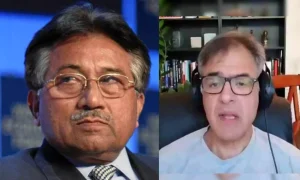Washington D.C. – Former CIA officer John Kiriakou has made sensational Musharraf CIA claims, alleging that the United States “purchased” former Pakistan president Pervez Musharraf by pumping millions of dollars into the country. In an even more explosive revelation, Kiriakou asserts that Musharraf handed over control of Pakistan’s nuclear arsenal to Washington during his tenure.
These Musharraf CIA claims come from Kiriakou, who served 15 years in the CIA as an analyst and later in counterterrorism operations. His allegations provide an insider’s perspective on US-Pakistan relations during a critical period in South Asian geopolitics and the global war on terror.
US Relationship with Musharraf’s Government

According to the Musharraf CIA claims, the United States maintained extraordinarily close relations with the Pakistani military leader’s government. Kiriakou explained the pragmatic nature of this relationship, stating, “The United States loves working with dictators. Because then you don’t have to worry about public opinion and you don’t have to worry about the media anymore.”
The former CIA officer’s Musharraf CIA claims detail how Washington “essentially just purchased Musharraf” through massive financial assistance. “We gave millions and millions and millions of dollars in aid, whether it was military aid or economic development aid,” Kiriakou revealed, adding that American officials would meet with Musharraf regularly, several times a week.
This financial relationship, central to the Musharraf CIA claims, allegedly gave the United States considerable influence over Pakistan’s policy decisions. “Essentially he would let us do whatever we wanted to do,” Kiriakou stated, though he acknowledged that Musharraf also had domestic constituencies to manage.
Nuclear Arsenal Control Allegations
Perhaps the most controversial aspect of the Musharraf CIA claims involves Pakistan’s nuclear weapons. Kiriakou alleged that when he was stationed in Pakistan in 2002, he was told unofficially that the Pentagon controlled the Pakistani nuclear arsenal.
“Musharraf had turned control over to the United States because he was afraid of exactly what you just described,” Kiriakou said, referring to concerns about nuclear weapons falling into terrorist hands. These Musharraf CIA claims, if accurate, would represent an unprecedented surrender of sovereignty over a nation’s strategic nuclear deterrent.
The timing of these alleged arrangements is significant. In 2002, Pakistan faced serious security challenges, including concerns about extremist infiltration of its military and intelligence services. The Musharraf CIA claims suggest that these fears prompted the extraordinary decision to cede nuclear control to a foreign power.
Double Game on Counterterrorism
The Musharraf CIA claims also address Pakistan’s controversial approach to counterterrorism. According to Kiriakou, Musharraf played a “double game,” cooperating with the United States on some fronts while allowing terror activities against India to continue.
“He had to keep the military happy. And the military didn’t care about al Qaeda. They cared about India,” Kiriakou explained in his Musharraf CIA claims. To maintain military support and satisfy certain extremist elements, Musharraf allegedly had to “allow them to continue this dual life of pretending to cooperate with the Americans on counterterrorism while committing terror against India.”
Kiriakou referenced the critical period around December 2001, when the Indian Parliament attack occurred, noting that “India-Pakistan were on the brink of war in 2002.” This context adds weight to the Musharraf CIA claims about Pakistan’s conflicted counterterrorism posture.
Systemic Corruption in Pakistani Leadership
Beyond the Musharraf CIA claims, Kiriakou painted a damning picture of corruption within Pakistan’s political elite. He described Pakistan as “deep buried under corruption,” where leaders lived lavishly abroad while ordinary citizens suffered.
The former CIA officer shared a particularly striking anecdote about former Prime Minister Benazir Bhutto during her exile in Dubai. Kiriakou recalled visiting Bhutto at her “$5 million palace on the Gulf” with another senior officer, where he served as note-taker.
Also Read: India US Trade Deal: Major Breakthrough Announced by Commerce Secretary Rajesh Aggarwal
The Bentley Incident
In a moment Kiriakou described as “Marie Antoinette-like,” Bhutto reportedly exclaimed upon hearing a car arrive: “If he came home with another Bentley, I’m going to kill him!” The “he” in question was her husband, Asif Ali Zardari, who allegedly maintained a collection of luxury Bentley automobiles.
This revelation, while separate from the primary Musharraf CIA claims, illustrates the broader context of elite corruption that Kiriakou observed. “She lives in a $5 million house and he has a collection of Bentleys. Aren’t they ashamed of themselves?” Kiriakou asked rhetorically.
Disparity Between Elite and Citizens
The Musharraf CIA claims and accompanying corruption allegations highlight the stark contrast between Pakistan’s ruling class and its general population. Kiriakou expressed shock at the disconnect: “How can they go back to Pakistan and look the Pakistani people in the face when their people don’t even have shoes and enough food to eat?”
While acknowledging that corruption was a known problem in Pakistan, Kiriakou emphasized that the scale he witnessed exceeded normal expectations. “I understand corruption is a problem there, but that level of corruption? Come on,” he stated.
Strategic Implications
The Musharraf CIA claims raise profound questions about sovereignty, nuclear security, and international relations. If the allegations about nuclear control are accurate, they would represent one of the most significant transfers of strategic authority in modern history.
These revelations also shed light on the complex trilateral relationship between the United States, Pakistan, and India during the early 2000s. The Musharraf CIA claims suggest that while publicly supporting Pakistan as an ally, the United States maintained extraordinary control over sensitive aspects of Pakistani state power.
Historical Context and Verification
The Musharraf CIA claims come from a source with direct access to classified information during the relevant period. However, these allegations remain unverified by official sources, and neither the US nor Pakistani governments have confirmed the nuclear control arrangements described by Kiriakou.
The Musharraf CIA claims nonetheless provide valuable insight into the nature of US-Pakistan relations during a pivotal period in South Asian history and the global war on terror.

